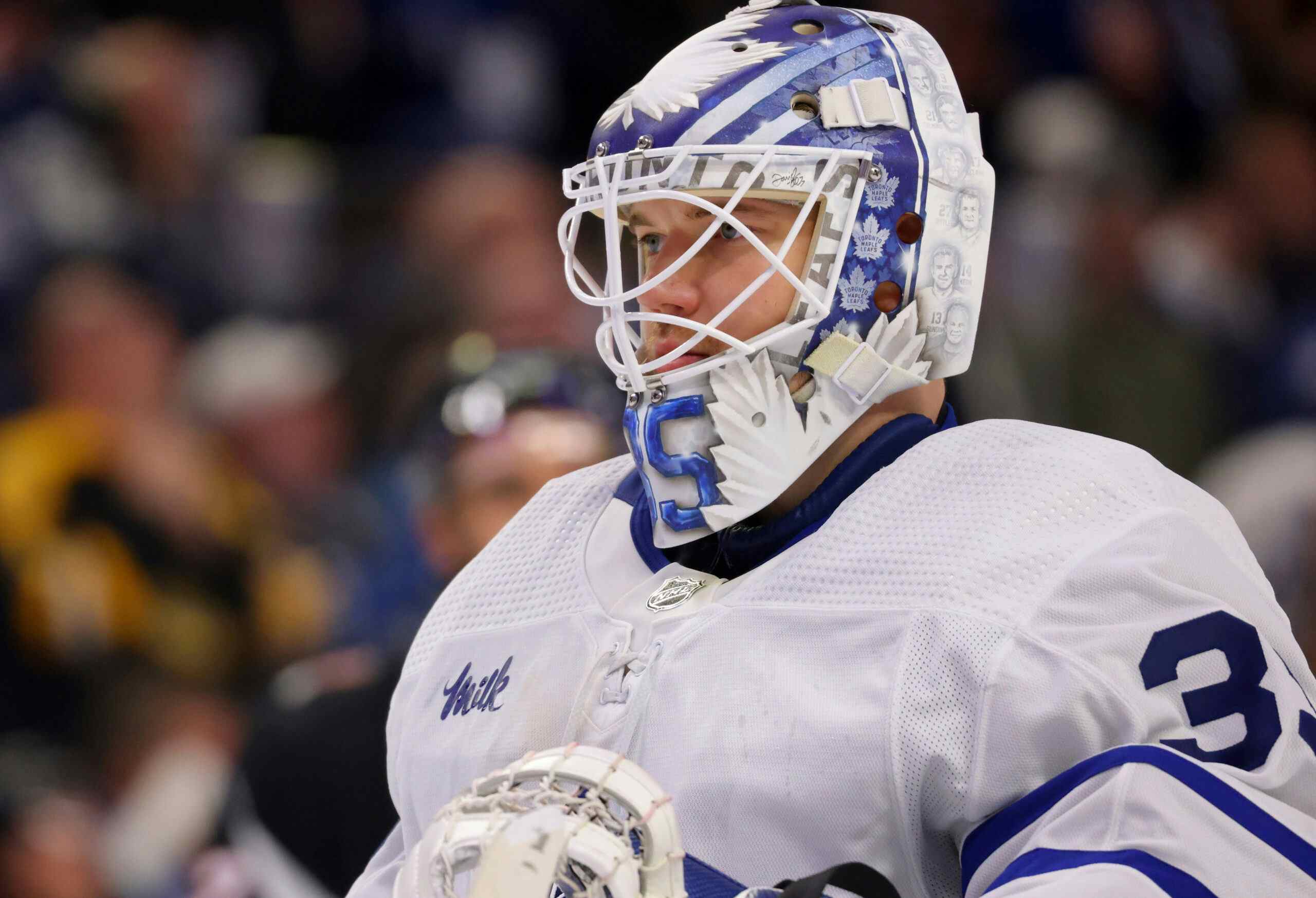There’s nothing wrong with saying what Tyler Bozak did was racist
By Cam Charron
11 years ago
I am a straight white male, which gives me a lot of privilege in the hockey world. But many of our readers are not straight white males, and one wrote in with an emphatic opinion of why it’s not okay to ignore that what Tyler Bozak did was racist. This following is a Leafs Nation guest post.
GUEST POST —
As you’ve probably heard, Tyler Bozak decided to pay tribute to one of his favourite musical artists by dressing up as Michael Jackson for Halloween this year. As you’ve probably also heard, he decided to provide his costume with a final touch of authenticity by painting his face black. Above is the picture he tweeted before hastily deleting.
Every time a public figure turns up in blackface, there’s a brief internet furor about whether blackface is racist. The consensus answer is generally: yes, for a number of historical and sociological factors, blackface is racist. That’s not what I want to discuss. My issue lies with what happens immediately after the initial outrage. With Tyler Bozak, as with Raffi Torres and Patrick Kane and Adam Burish before him, there was a noticeable lack of discussion of his actions, beyond the conclusion that blackface, in the abstract, is racist.






Twitter, for example, is usually my initial sounding board for breaking news. The majority of reactions I saw from the hockey community on twitter ran something like this (my reactions in parentheses):
- Oh shit, Tyler Bozak in…is that blackface? Yikes. (Okay.)
- Blackface is racist. Very racist! That’s bad. No good at all. (Yes!)
- Well. But it’s not like Tyler Bozak is a real racist. There’s no way he actually hates black people. Right, that would be dumb. (Wait, what?)
- Man, hockey players can be pretty dumb. I really wish hockey players weren’t so dumb. (Wait, what???)
- I’m angry about Star Wars Episode VII again. (God damn it.)
I may be joking about the Star Wars thing, but I don’t think that steps one through four were a productive way to respond to the situation, and here’s why: there is no such thing as a “real” racist. Pretending that there is such a thing inevitably derails what could otherwise be useful and informative discourse on inappropriate behaviour. Yes, there is an intensity scale of racist behaviour – nobody, including me, suspects Tyler Bozak of being a card-carrying Klan member – but that doesn’t make less aggressively racist things not actually racist. While the attempted contextualising “hockey players are just dumb, not actually racist” comments may not have the intended effect of stripping culpability from problematic behaviours, that’s what ends up happening. It reroutes the conversation from being about racism to being about labels and blame. And it sucks.
Most mainstream news & sports outlets which have covered these stories simply report on the facts, and don’t offer opinions.# To give credit to the hockey blogosphere, it has sometimes bothered to go a step further and actually discuss the problematic nature of blackface. Unfortunately, again, much of the conversation has focused on absolving Bozak/Torres/et al of racist ill intent via the context of dumb/thoughtless hockey player, as if that matters:
Here are some examples of the “Tyler Bozak isn’t a racist” school of thought, all culled exclusively from hockey writers whom I usually think are notably reasonable and thoughtful in their reactions:
Obviously, your reaction to this costume, and those like it, is framed by your own experiences, sensitivities and taste. …Your truly, pudgy white boy from the Jersey suburbs, thought the backlash against the Blackhawks was manufactured outrage. Harrison Mooney, black guy from B.C., didn’t believe Raffi Torres was racist but did believe that his costume was racially insensitive and thoughtless.
Now I think it’s probable that Raffi Torres, a ginger whose father hails from Mexico City, doesn’t have a racist bone in his body.…Here’s the point to me: blackface halloween costumes are racist at worst, and woefully ignorant at best. They’re in indefensible poor taste and any smart person knows it. There’s context here though, hockey players and the world they inhabit isn’t always enlightened.
Suffice it to say, racism of that sort is fairly rare, but I get the sense that it’s still what people think about when they hear words like “racism” being bandied about. It’s understandable, then, that people would balk at any insinuation that Raffi Torres is or was that kind of racist when he dressed up like Jay-Z, black face and all, for a Halloween party Sunday night.I’m confident that Torres had no racial slight in mind when his wife and he came as Beyonce and boo, respectively. When asked by partygoers what they were, they probably didn’t say, “Two racists.”I will gladly defend Torres as a non-racist, and not because he’s a Mexican represented by a black agent (although that’s a pretty good indication his opinions on ethnicity are a little more nuanced than some have suggested); rather, I’ll back him up because wearing blackface simply does not make you a racist.
What we think that’s getting at is this: hey, we’re sure Torres isn’t a bad guy or anything, and that he meant no harm. However, due to the history of blackface that we mentioned earlier, it was inevitable it would be seen as “ill-advised.” And refusal to see or acknowledge why it would be seen as ill-advised just seems like annoyance at having to bother with pesky racial sensitivity because it would be easier not to.
It’s a fair thing to say that hockey players do dumb things pretty frequently. Tyler Bozak is probably not the smartest dude anybody knows. He probably doesn’t consciously hate black people or believe them to be inferior to white people. And he’s probably grown careless after years of hanging out in an environment (the pro sports locker room) which is not known for encouraging socially progressive behaviour. These things might explain why he didn’t stop to analyse the impact of his actions, but, again, none of these explanatory factors make his actions not actually racist. Blackface is racist. Tyler Bozak did a pretty racist thing – several pretty racist things, if you look toward his past Halloween escapades – and we can, and should, call him out on it.
Somewhere along the way, it became offensive to simply acknowledge that a thing or person is racist, leading to the application of words such as “insensitive” or “ill-advised”. This is patently ridiculous. Things or people can be insensitive or ill-advised in a million different ways. Racist things or people are insensitive and ill-advised because they are racist, and that critical aspect shouldn’t be denied. The instinct to deny being racist is a logical one – by and large, most people understand that racism is bad and don’t want to be identified with it. But immediately leaping then to contextualise or to explain away the behaviour is absolutely the wrong response.
Racist is a descriptor, of actions or situations or sometimes people. It’s not an epithet, it’s not invective – it’s a way to identify something or someone as problematic, with (I hope) the objective of helping to correct or change the inappropriate behaviour/belief. Being racist, or doing something racist, doesn’t necessarily mean that you hate anybody, or that you are by definition a bad or less worthy person. It simply means that you did something wrong, and you should probably think about how it was wrong, learn from it, and move on.
Yesterday, the National Post ran an interview with Professor Barrington Walker, associate professor of history at Queen’s University and self-professed Leafs fan, and this question/answer stood out to me:
So, the big question, then: Is what he did racist? Can you still be racist without intent?Walker: “Well, you know, unfortunately, my answer to that question would be yes. And not everybody would agree. There are different ways that racism manifests itself. And there are direct and conscious acts of racism that people, unfortunately, will commit on each other. And then there’s the kind of racism that has more to do with unintended consequences, unintended effects. There’s structural racism. There’s institutional racism … I wouldn’t say that [Bozak] consciously, knowingly, acted with racial malice. But I would say that there’s a long history that he wasn’t aware of, and he kind of walked right into it.”
The damaging impact of racism infrequently arises from deliberate malice; tying effect to intent denies, amongst other things, the overwhelming negative effects of institutional and systemic racism. Categorising racist behaviour as not being the end of the world because the perpetrator is a nice hockey-playing boy, who probably didn’t mean anything by it, is wildly counter-productive, and also a pretty illustrative manifestation of that white privilege that people talk so much about these days. And guess what, white people? This isn’t about you. When somebody does something racist, stop trying to defend it or explain it or slot it in on some sliding scale of importance based on your personal white-person view of what racism is and what it all means.
Of course Tyler Bozak in blackface (twice!) is not the end of the world – but it’s also not nothing. If it affects people and they want to talk about it, they should be able to talk about it. I saw numerous people state (see above), as they frequently do in these kinds of situations, that Bozak was being “accused” of racism, and I’m very troubled by that terminology. Defendants are “accused” of crimes when it hasn’t yet been proven that they’ve done anything wrong – once you’re convicted, you’re not an accused anything, you’re just a criminal. There are clearly times and places when the label of racism is used inaccurately, but the implication of the term “accused” was that, even though blackface is widely acknowledged to be a racist act, somehow there existed mitigating or ameliorating factors which might make Tyler Bozak in blackface not racist. (Spoiler alert: there weren’t. There never are.)
I, personally, find it mystifying that in the year 2012, a university-educated human being born and raised in one of the most multicultural countries in the world, would find it acceptable to don blackface repeatedly. I find it upsetting in the context of hockey, a sport which I love, but which has never even approached being ethnically or culturally diverse. And I find it particularly upsetting given that this lack of ethnic and cultural diversity is, at least in Canada (Tyler Bozak’s home and native land), threatening the future success of the sport. Is Tyler Bozak responsible for hockey being such a white-dominated sport? No, of course not. Is he helping? No, of course not.
It’s easy to condemn the big things, the hate crimes, the violence and the obvious, deliberate malice. But it’s the little things that prevail, that don’t get stamped out because nobody wants to call anybody else a racist, that maintain this uneasy status quo. The discussion should be about these things: about why and how this happened, about the impact of Tyler Bozak’s actions, and how to negate that impact, rather than how fair or unfair it is to call Tyler Bozak racist. Focusing on that takes the attention away from the actual issue of racism, how it can be addressed, and how we can all learn from these situations.
Recent articles from Cam Charron





